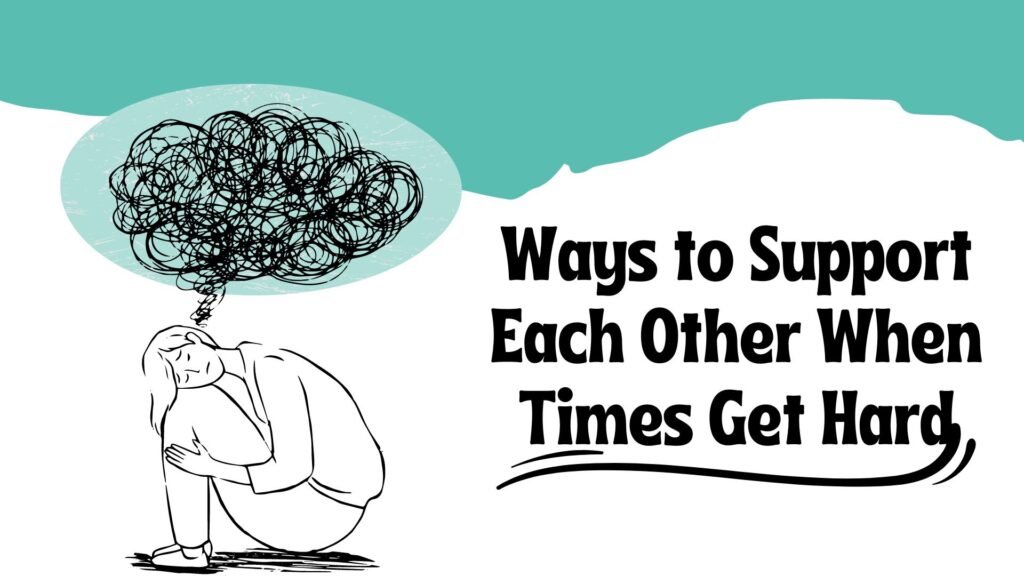Life can be unpredictable, and difficult times are inevitable. Whether it’s the loss of a loved one, financial struggles, or health challenges, having a strong support system makes all the difference. Providing and receiving support during tough times is essential for emotional well-being and healing. This article explores several ways to support each other when times get hard, emphasizing communication, empathy, practical assistance, and emotional presence.
Active Listening and Open Communication
One of the most important ways to support someone going through a difficult time is by being an active listener. People often need a safe space to express their thoughts and emotions without fear of judgment. Listening actively means being fully present, not interrupting, and acknowledging their feelings. Sometimes, the act of sharing their concerns can bring a great sense of relief to the person in need.
Open communication also fosters a sense of connection. Ask open-ended questions, encourage them to share as much or as little as they feel comfortable with, and avoid rushing to provide solutions. Simply being there to listen can be more comforting than offering advice or opinions. When people feel heard, they are more likely to process their emotions and feel validated.
Offering Practical Assistance
In addition to emotional support, offering practical help can be immensely valuable during difficult times. Whether someone is grieving the loss of a loved one or dealing with a serious illness, everyday tasks can become overwhelming. You can lend a hand by assisting with household chores, running errands, or preparing meals. Offering specific help, like “I can pick up groceries for you,” is often more effective than a general “Let me know if you need anything.”
In situations where someone is dealing with a significant life event, such as making funeral plans or handling medical treatments, the emotional burden is heavy. Practical assistance during these moments allows the person to focus on their emotional well-being and reduces their stress. Sometimes, knowing that someone else is handling the small, mundane tasks makes a world of difference during challenging times.
Offering Empathy and Emotional Support
Empathy is a cornerstone of supporting others in tough times. It involves understanding and sharing another person’s feelings, and letting them know that they are not alone. When someone faces hardship, whether it’s a personal loss or a life crisis, they may feel isolated. Empathizing with their pain can reduce this sense of isolation and show them that you are there for them.
Being emotionally available means showing up, even when it’s uncomfortable or when you don’t know the perfect thing to say. Sometimes, all someone needs is a kind word, a hug, or the reassurance that they are not a burden. Small gestures of kindness, such as sending a thoughtful message or spending time together, go a long way in showing emotional support. Genuine empathy helps to strengthen relationships and lets the person in need know that you truly care.
Creating a Safe and Non-Judgmental Space
Difficult moments often bring up complex emotions like sadness, anger, or frustration. It’s important to create a safe space where someone can express their feelings without fear of judgment. People need to know they can be vulnerable and share their true emotions without being criticized or dismissed.
Being a non-judgmental listener means accepting their emotions, no matter how raw or irrational they may seem. Avoid offering unsolicited advice or attempting to “fix” the problem, unless asked. Respect their feelings and let them navigate their emotional journey at their own pace. Creating this safe space helps them process difficult emotions and fosters trust within the relationship.
Encouraging Professional Help and Self-Care
While emotional and practical support from friends and family is crucial, sometimes the challenges someone is facing may require professional help. Whether it’s therapy, counseling, or medical assistance, encouraging someone to seek professional help when necessary is an important part of supporting them. Mental health professionals can offer specialized guidance and tools to help manage grief, anxiety, depression, or other emotional struggles.
Self-care is also vital during difficult times. Encourage your loved one to take care of themselves, whether that means taking a walk, engaging in a hobby, or simply resting. Remind them that self-care isn’t selfish, but a necessary part of healing and coping with stress. Offering support in the form of a self-care reminder or even joining them in a relaxing activity can help ease the burden and promote healing.
Being Consistent and Available
One of the most powerful ways to show support during hard times is through consistency. Often, the initial flood of sympathy comes right after a difficult event, but support can dwindle as time goes on. Staying consistent in your support—checking in regularly, offering help even weeks or months after the event—shows that you genuinely care.
It’s also important to be available in the long run. Grief, recovery, or coping with life changes doesn’t happen overnight. Whether it’s sending a thoughtful text or making time to meet for a coffee, showing up consistently lets the person know that they are not forgotten. This long-term presence can provide the stability and comfort needed for healing and coping.
Respecting Their Boundaries
While it’s important to offer help and support, respecting the other person’s boundaries is equally crucial. Sometimes, people need space to process their emotions privately. It’s important to recognize when someone is withdrawing because they need solitude and when they need support. Asking them directly what they need—whether that’s company, assistance, or space—allows you to respect their personal preferences.
Boundaries also apply to the amount of emotional support you can provide. It’s important to avoid taking on too much or feeling responsible for fixing their situation. By respecting your own limits, you can be a more effective and supportive friend without burning out.
Supporting each other during hard times strengthens bonds and helps alleviate emotional burdens. Whether by actively listening, offering practical help, empathizing, or simply being present, these acts of kindness help people feel less alone. Encouraging self-care and professional assistance, respecting boundaries, and being consistent in your support are key ways to provide meaningful help during difficult periods.
Life’s challenges may seem insurmountable at times, but having a supportive community makes the journey easier. Small gestures of kindness and understanding can make a significant difference. Ultimately, the love and care we extend to one another during these trying times helps build resilience and reminds us that we are never alone in our struggles.









